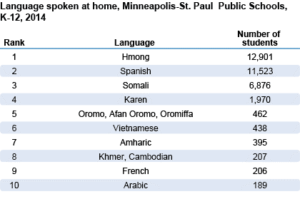English Language Learners
English-language learner (ELL)
An English language learner (often capitalized as English Language Learner or abbreviated to ELL) is a person who is learning the English language in addition to his or her native language. The instruction and assessment of students, their cultural background, and the attitudes of classroom teachers towards ELLs have all been found to be factors in ELL student achievement. (Wikipedia)
The twin cities have 35,167 students where the primary language different for English. These are all potential special education students.

While these are two of the largest districts in the state, many districts faced with the same problem.
I believe that most of these families would assist their children if they had the tools and instructions to teach their children.
A two-part problem exists, the children, don’t speak English, which requires special education, and the parents don’t speak English, which is problematic when trying to talk to teachers.
Solutions:
Translation apps can help communication between teachers and parents.
The second part of this problem is complicated for some families. It is not feasible to use the internet for impoverished families. Data charges limit the video option on smartphones, and simple access to the internet is not always possible.
High-quality daycare from birth would assist in solving this problem.
Translator apps to consider are Google Translates (103 languages), itranslate (100+) or Microsoft Translator (60+)
Webpages: Use similar strategies to the British Council’s webpage ‘Learn English Kids’ to assist families in teaching (and learn) English. (https://learnenglishkids.britishcouncil.org/)
Solving this problem in daycares will save school districts millions in special education costs.